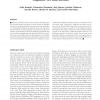Free Online Productivity Tools
i2Speak
i2Symbol
i2OCR
iTex2Img
iWeb2Print
iWeb2Shot
i2Type
iPdf2Split
iPdf2Merge
i2Bopomofo
i2Arabic
i2Style
i2Image
i2PDF
iLatex2Rtf
Sci2ools
110
click to vote
JOCN
2011
2011
Role for Presupplementary Motor Area in Inhibition of Cognitive Set Interference
■ Proactive interference (PI), which is formed through repetition of certain behavior and lasts for a while, needs to be inhibited in order for subsequent behavior to prevail over the antecedent one. Although the inhibitory mechanisms in the pFC have been reported that are recruited long after one behavior is updated to another, very little is known about the inhibitory mechanisms that are recruited immediately after the update. The WCST was modified in the present fMRI study such that inhibition of PI could be examined both immediately after and long after update of behavior. Use of “dual-match” stimuli allowed us to compare two types of trials where inhibition of PI was and was not required (control and release trials, respectively). Significant activation was observed in the left pre-SMA during control versus release trials. The pre-SMA activation was selective to PI inhibition required immediately after update of behavior, which exhibited marked contrast to the left anterior...
Behavior | Inhibitory Mechanisms | JOCN 2011 | Update |
| Added | 14 May 2011 |
| Updated | 14 May 2011 |
| Type | Journal |
| Year | 2011 |
| Where | JOCN |
| Authors | Seiki Konishi, Takamitsu Watanabe, Koji Jimura, Junichi Chikazoe, Satoshi Hirose, Hiroko M. Kimura, Yasushi Miyashita |
Comments (0)

